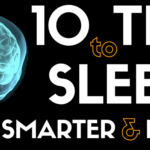Pre diabetes symptoms and why sleep matters so much
Around 88 million people across America live with diabetes. It’s a disease that’s on the rise and is closely linked to diet and lifestyle. Understanding pre diabetes symptoms and the role sleep plays in this disease can prevent diabetes from developing. It can also help those who already suffer from diabetes to manage it better.
Along with diet, sleep has a great impact on our risk of developing type 2 diabetes. When we sleep well, hormone balance is supported. When our sleep quality is compromised, so is the balance of hormones in our system. Sleep deprivation leads to insulin resistance and insulin resistance can lead to type 2 diabetes.
Gathering data with a device such as the Eversense sensor can help you begin your wellness journey and avoid pre diabetes forever.
Type 2 diabetes usually develops in adulthood and although it results in a struggle to produce enough insulin, it can also cause sufferers difficulties using the insulin they do produce. Unlike type 1 diabetes, type 2 diabetes can be reversed if acted upon early enough.
Sleep and diabetes type 2

Because type 2 diabetes results in problems producing insulin and using the insulin you do produce, sleep plays an important role in prevention. Good sleep quality allows us to cycle through to the restorative stages of sleep.
While we sleep our body naturally raises our blood sugar level as it tends to these restorative processes. The later stages of sleep, slow-wave or deep sleep, are when our body restores muscles, rids the brain of toxins, consolidates learning and regulates our hormones. Glucose powers our cells through these functions.
How sleep disturbances increase the risk of type 2 diabetes
When we don’t get enough quality sleep to allow us to cycle through all four sleep stages, it upsets our hormone production in several ways. Cortisol increases with lack of sleep, this has the knock-on effect of increasing glucose levels. Our sensitivity to insulin decreases, so the glucose in our blood can’t be used effectively by our cells. Our pancreas responds by producing more insulin.
On top of this ghrelin and leptin, hormones that help control appetite also become imbalanced. Ghrelin, which increases appetite, spikes. Leptin, which does the opposite, drops. The combination of this hormone imbalance leaves us hungry, unable to utilize the blood sugar in our systems already and less responsive to the insulin that helps us turn blood sugars into energy.
Reaching for sugary snacks can make it harder to sleep well the following night and the cycle begins over again. This leads to weight gain, poor sleep, feeling grumpy and seesawing blood sugar.
If this cycle of sleep disturbance goes on for too long, we can train our bodies to be less sensitive to the insulin our pancreas produces. This insulin resistance is a key element of type 2 diabetes. Choosing healthier snacks is a good place to start breaking this cycle.
Sleep apnea and diabetes

Obstructive sleep apnea is the most common form of this sleep disorder. As we fall asleep our throat, tongue and soft tissues of the mouth relax. Obstructive sleep apnea causes these tissues to block our airways, disrupting sleep. This results in loud snoring, periods of waking slightly, even gasping and choking noises.
Many people may not be aware they suffer from sleep apnea, although they wake to feel tired. Difficulty concentrating through the day, irritability, mood swings and waking with a headache are also signs of sleep apnea. Usually, this sleep condition is related to carrying excess weight and obesity.
Because it stops people from cycling through to restorative sleep, problems with cortisol, glucose and insulin insensitivity can develop. The excess weight that prompts obstructive sleep apnea also instigates cells to become less sensitive to the insulin that the pancreas produces.
Aside from weight loss, continuous positive airway pressure (CPAP) has been shown to be beneficial for people suffering from this sleep disorder. A small mask is worn while sleeping through which air is blown from a small compressor. This keeps airways open, improving sleep quality and reducing insulin resistance. This is one of the sleep disorders closely linked to developing type 2 diabetes.
Diabetes and sleep
Sleep is foundational for our general health and wellbeing. The various process that happen throughout deep sleep helps us to prepare for the day ahead while making the most of the day we’ve had. Lack of sleep impacts all areas of our health and increases our risk of diabetes too. Diabetes and sleep are intimately related as are sleep disorders and diabetes.
When blood sugar levels are low, slumber can be disturbed by nightmares, night sweats or even our brain waking us up to eat! When we have high blood sugar levels, our kidneys get to work trying to flush the excess from our system by causing us to urinate more. These frequent trips to the toilet break our sleep and make it difficult to reach the quality slumber our bodies need.
Other sleep disorders common with type 2 diabetes
Various studies show that sleep deprivation increases our risk of diabetes but also that diabetes increases our chances of having difficulty sleeping. The fluctuating blood sugar levels that are a part of diabetes make it difficult to fall asleep or stay asleep. Sleep disorders such as insomnia, restless leg syndrome and obstructive sleep apnea often go hand in hand with diabetes type 2.
Restless leg syndrome involves uncomfortable sensations in the legs that trigger an urge to move. Studies show this is more common in people with diabetes, although the causes are unclear. Factors such as poor blood sugar control, obesity, vitamin and mineral deficiencies are thought to play a role.
Insomnia covers a number of different sleep problems. Difficulty falling asleep, trouble staying asleep, waking early and waking unrefreshed are all hallmarks of insomnia. The sleep deprivation associated with this condition makes it difficult to manage blood sugar for diabetes. It also increases the risk of developing type 2 diabetes.
Sleep deprivation and poor sleep quality can have a compounding effect on how well we can manage diabetes and our sleep cycles. When sleep is disrupted it can be difficult to get it back on track. Reaching for foods and drinks to keep us awake or napping to catch up on lost sleep both make it more difficult to find quality sleep the following night. Choosing a healthy diet by planning meals and making sure we get quality sleep can reduce our risk of diabetes type 2.
Want to unlock greater wellness?
Listen to our friends over at the Wellness + Wisdom Podcast to unlock your best self with Drew Canole of Organifi:








 8 Tips to Avoid Prediabetes Forever
8 Tips to Avoid Prediabetes Forever